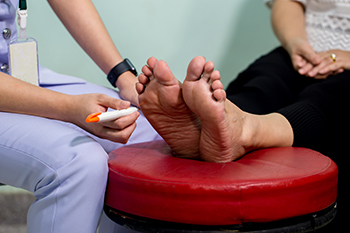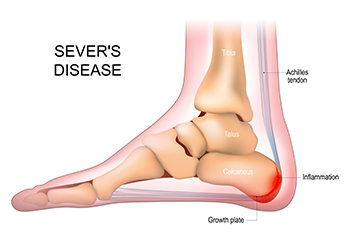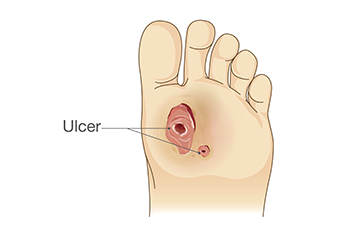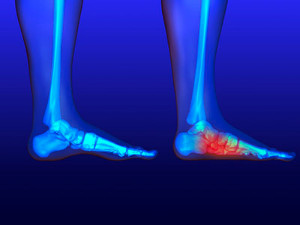January 2024
Understanding Numb Feet During Pregnancy

The phenomenon of numb feet during pregnancy is a common yet often perplexing experience for expectant mothers. The increased pressure on blood vessels and nerves, primarily in the lower extremities, is a key factor contributing to this sensation. As the uterus expands to accommodate the growing baby, it can exert pressure on the pelvic blood vessels, hindering optimal circulation. This reduced blood flow to the feet can result in numbness and tingling sensations. Furthermore, hormonal changes during pregnancy can impact nerve function, amplifying the likelihood of experiencing numbness. While this occurrence is generally harmless, pregnant women must prioritize proper footwear, avoid prolonged periods of standing, and incorporate gentle exercises to promote circulation. If you are experiencing foot pain or numbing sensations during your pregnancy, it is suggested that you visit a podiatrist who can provide you with additional relief methods.
Pregnant women with swollen feet can be treated with a variety of different methods that are readily available. For more information about other cures for swollen feet during pregnancy, consult with Dr. Stephen Petrofsky from Florida. Our doctor will attend to all of your foot and ankle needs.
What Foot Problems Can Arise During Pregnancy?
One problem that can occur is overpronation, which occurs when the arch of the foot flattens and tends to roll inward. This can cause pain and discomfort in your heels while you’re walking or even just standing up, trying to support your baby.
Another problem is edema, or swelling in the extremities. This often affects the feet during pregnancy but tends to occur in the later stages.
How Can I Keep My Feet Healthy During Pregnancy?
- Wearing orthotics can provide extra support for the feet and help distribute weight evenly
- Minimize the amount of time spent walking barefoot
- Wear shoes with good arch support
- Wear shoes that allow for good circulation to the feet
- Elevate feet if you experience swelling
- Massage your feet
- Get regular, light exercise, such as walking, to promote blood circulation to the feet
If you have any questions please feel free to contact our office located in Port Charlotte, FL . We offer the newest diagnostic and treatment technologies for all your foot and ankle needs.
Understanding Neuropathy Symptoms in the Feet

Neuropathy, a condition that affects the peripheral nerves, can result in various symptoms, and often has a pronounced impact on the feet. Individuals experiencing neuropathy may encounter sensations of tingling, burning, or numbness in their lower extremities. These discomforting sensations can progress to sharp, stabbing pain, hindering mobility and diminishing overall quality of life. Loss of coordination and balance may also occur, elevating the risk of falls and injuries. Changes in skin texture and temperature, coupled with muscle weakness, are additional indicators of neuropathy. As the condition advances, individuals may develop foot deformities. Seeking medical attention when these signs arise is imperative to identify the underlying causes, which may include diabetes, infections, or autoimmune disorders. If you are experiencing symptoms of neuropathy in your feet, it is suggested that you visit a podiatrist who can accurately diagnose this condition and offer treatment methods.
Neuropathy
Neuropathy can be a potentially serious condition, especially if it is left undiagnosed. If you have any concerns that you may be experiencing nerve loss in your feet, consult with Dr. Stephen Petrofsky from Florida. Our doctor will assess your condition and provide you with quality foot and ankle treatment for neuropathy.
What Is Neuropathy?
Neuropathy is a condition that leads to damage to the nerves in the body. Peripheral neuropathy, or neuropathy that affects your peripheral nervous system, usually occurs in the feet. Neuropathy can be triggered by a number of different causes. Such causes include diabetes, infections, cancers, disorders, and toxic substances.
Symptoms of Neuropathy Include:
- Numbness
- Sensation loss
- Prickling and tingling sensations
- Throbbing, freezing, burning pains
- Muscle weakness
Those with diabetes are at serious risk due to being unable to feel an ulcer on their feet. Diabetics usually also suffer from poor blood circulation. This can lead to the wound not healing, infections occurring, and the limb may have to be amputated.
Treatment
To treat neuropathy in the foot, podiatrists will first diagnose the cause of the neuropathy. Figuring out the underlying cause of the neuropathy will allow the podiatrist to prescribe the best treatment, whether it be caused by diabetes, toxic substance exposure, infection, etc. If the nerve has not died, then it’s possible that sensation may be able to return to the foot.
Pain medication may be issued for pain. Electrical nerve stimulation can be used to stimulate nerves. If the neuropathy is caused from pressure on the nerves, then surgery may be necessary.
If you have any questions, please feel free to contact our office located in Port Charlotte, FL . We offer the newest diagnostic and treatment technologies for all your foot care needs.
What Causes Sever’s Disease?

Sever's disease, a common heel condition affecting active children, stems from specific factors that influence the growth plate at the back of the heel. This condition primarily arises during the growth spurts of adolescence when the heel bone, or calcaneus, grows faster than the Achilles tendon. The Achilles tendon, responsible for connecting the calf muscles to the heel, becomes tight and exerts increased tension on the heel's growth plate. Simultaneously, vigorous physical activities, especially those involving running or jumping, exacerbate the stress on the growth plate, triggering inflammation and pain. Factors like improper footwear or engaging in sports on hard surfaces can contribute to the development of Sever's disease. If your active child has heel pain, it is strongly suggested that you consult a podiatrist who can successfully treat Sever’s disease.
Sever's disease often occurs in children and teens. If your child is experiencing foot or ankle pain, see Dr. Stephen Petrofsky from Florida. Our doctor can treat your child’s foot and ankle needs.
Sever’s Disease
Sever’s disease is also known as calcaneal apophysitis, which is a medical condition that causes heel pain I none or both feet. The disease is known to affect children between the ages of 8 and 14.
Sever’s disease occurs when part of the child’s heel known as the growth plate (calcaneal epiphysis) is attached to the Achilles tendon. This area can suffer injury when the muscles and tendons of the growing foot do not keep pace with bone growth. Therefore, the constant pain which one experiences at the back of the heel will make the child unable to put any weight on the heel. The child is then forced to walk on their toes.
Symptoms
Acute pain – Pain associated with Sever’s disease is usually felt in the heel when the child engages in physical activity such as walking, jumping and or running.
Highly active – Children who are very active are among the most susceptible in experiencing Sever’s disease, because of the stress and tension placed on their feet.
If you have any questions, please feel free to contact our office located in Port Charlotte, FL . We offer the newest diagnostic and treatment technologies for all your foot and ankle injuries.
Are Bunions Affecting Your Everyday Life?
What Is a Diabetic Foot Ulcer?

A diabetic foot ulcer is a significant and potentially serious complication arising from diabetes, characterized by open sores or wounds on the feet. The condition evolves due to a combination of factors associated with diabetes, such as impaired blood circulation, nerve damage, and compromised immune function. Elevated blood sugar levels contribute to reduced blood flow and sensation in the extremities, making the feet susceptible to injury. Minor cuts, blisters, or friction can escalate into non-healing ulcers due to the body's compromised ability to repair itself. What sets diabetic foot ulcers apart is their propensity for infection and slow healing, posing a heightened risk of severe complications if left untreated. Understanding the definition of diabetic foot ulcers underscores the importance of vigilant foot care, regular examinations, and proactive management strategies. If you have diabetes and have developed a diabetic foot ulcer, it is strongly suggested that you speak to a podiatrist who can guide you toward the best management and treatment strategies for this type of wound.
Wound care is an important part in dealing with diabetes. If you have diabetes and a foot wound or would like more information about wound care for diabetics, consult with Dr. Stephen Petrofsky from Florida. Our doctor will assess your condition and provide you with quality foot and ankle treatment.
What Is Wound Care?
Wound care is the practice of taking proper care of a wound. This can range from the smallest to the largest of wounds. While everyone can benefit from proper wound care, it is much more important for diabetics. Diabetics often suffer from poor blood circulation which causes wounds to heal much slower than they would in a non-diabetic.
What Is the Importance of Wound Care?
While it may not seem apparent with small ulcers on the foot, for diabetics, any size ulcer can become infected. Diabetics often also suffer from neuropathy, or nerve loss. This means they might not even feel when they have an ulcer on their foot. If the wound becomes severely infected, amputation may be necessary. Therefore, it is of the upmost importance to properly care for any and all foot wounds.
How to Care for Wounds
The best way to care for foot wounds is to prevent them. For diabetics, this means daily inspections of the feet for any signs of abnormalities or ulcers. It is also recommended to see a podiatrist several times a year for a foot inspection. If you do have an ulcer, run the wound under water to clear dirt from the wound; then apply antibiotic ointment to the wound and cover with a bandage. Bandages should be changed daily and keeping pressure off the wound is smart. It is advised to see a podiatrist, who can keep an eye on it.
If you have any questions, please feel free to contact our office located in Port Charlotte, FL . We offer the newest diagnostic and treatment technologies for all your foot care needs.
When Flat Feet Need a Surgical Solution

Flat feet, a condition where the arches of the feet are significantly reduced or absent, can cause discomfort and limit mobility for some individuals. While many cases of flat feet can be managed with conservative treatments like orthotics, exercises, and supportive footwear, there are situations where surgery becomes a viable option. Surgical intervention for flat feet typically aims to reconstruct and restore the arches of the feet, improving overall foot function and alleviating pain. This procedure is known as flatfoot reconstruction surgery. Podiatric surgeons may employ various techniques, such as tendon transfers, bone realignment, or the use of implants to achieve the desired results. Candidates for flatfoot surgery often include people who experience severe pain, difficulty in walking, or whose flat feet result from structural abnormalities. If you suspect you may need flatfoot surgery, it is suggested that you schedule an appointment with a podiatrist to discuss whether this is a correct option for you.
Flatfoot is a condition many people suffer from. If you have flat feet, contact Dr. Stephen Petrofsky from Florida. Our doctor will treat your foot and ankle needs.
What Are Flat Feet?
Flatfoot is a condition in which the arch of the foot is depressed and the sole of the foot is almost completely in contact with the ground. About 20-30% of the population generally has flat feet because their arches never formed during growth.
Conditions & Problems:
Having flat feet makes it difficult to run or walk because of the stress placed on the ankles.
Alignment – The general alignment of your legs can be disrupted, because the ankles move inward which can cause major discomfort.
Knees – If you have complications with your knees, flat feet can be a contributor to arthritis in that area.
Symptoms
- Pain around the heel or arch area
- Trouble standing on the tip toe
- Swelling around the inside of the ankle
- Flat look to one or both feet
- Having your shoes feel uneven when worn
Treatment
If you are experiencing pain and stress on the foot you may weaken the posterior tibial tendon, which runs around the inside of the ankle.
If you have any questions please feel free to contact our office located in Port Charlotte, FL . We offer the newest diagnostic and treatment technologies for all your foot and ankle needs.







